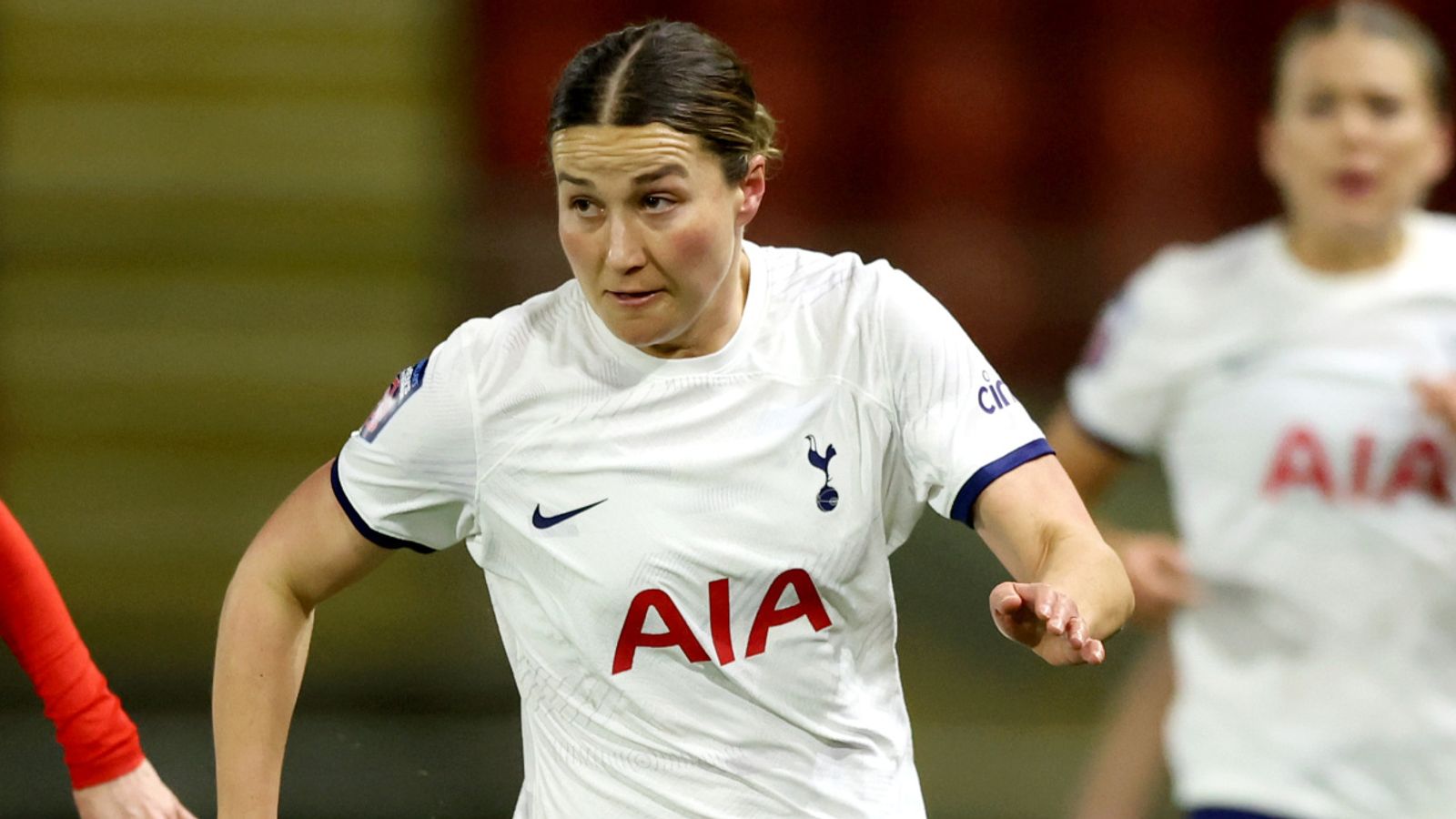
Playing for the Planet: How Tottenham Women defender Amy James-Turner is carrying fight against climate change | Football News
Jody
- 0
Amy James-Turner helped Tottenham make history on the pitch in March, calmly slotting home a decisive winning penalty against Manchester City en route to Spurs reaching the Women’s FA Cup Final.
But arguably her greatest contribution yet could be off the pitch.
In between training, playing and running her side-hustle coffee van business, James-Turner has spent most of the last season preparing a first-of-its-kind report, exploring the voice of women’s football on climate.
It’s part of her role as an ambassador for fan-engagement platform Planet League, who have helped her put together the report.

James-Turner is also an ambassador for Green Football Weekend
“I’ve been on my own journey with the climate, and it’s been tough,” said James-Turner. “The more you understand, the darker it seems to get. There’s been many lonely times along the way too.
“Times that made me think: am I really alone in this or do other people feel the same, just we don’t talk about it?”
Well, now she’s certainly got people talking about it.
One hundred and thirteen surveys by female professionals representing 36 different clubs were completed, and the Spurs defender also did 10 in-depth interviews to get the stories behind the stats. It’s an impressive volume of work to balance with a career in elite-level football.

The future of football is at risk due to the effects of climate change, with 150,000 games already cancelled per year due to pitch flooding
The findings may represent perhaps broadly-held views both in football and society, but the quantitative data shows the depth of those feelings, as do the anecdotal comments.
Seventy-one per cent of respondents either agreed or strongly agreed that climate change had affected playing conditions during their careers, with former Arsenal forward Jodie Taylor recounting an extraordinary experience in North America.

West Ham striker Emma Harries, Tottenham coach Vicky Jepson and former Arsenal striker Jodie Taylor joined James-Turner to speak with Sky Sports’ David Garrido
“I’ll never forget when I was in Seattle and there was really bad air pollution,” Taylor tells Sky Sports. “The orange sky, it was crazy conditions to be playing in.
“You’re driving to the game and you can barely see. The government put out messages for everyone to stay home and not exercise outside, and there’s us driving to matches.”
Taylor was one of three football colleagues who came into Sky to do some filming for this story as the latest episode of our “Playing for the Planet” series, along with Tottenham coach Vicky Jepson and West Ham striker Emma Harries.
Please use Chrome browser for a more accessible video player

Sky Sports’ David Craig teams up with Pledgeball’s Katie Cross to discuss the importance of Green Football Weekend.
The rest of those who completed surveys were anonymous, and as the report states, perhaps the saddest reflection on the implications of climate change was this:
“The thought of me having a baby for example. There’s no way. Why would you want to bring a kid into the world?”
Another damning statistic was that only 19 per cent of respondents rated the steps taken by their club or league to address environmental concerns as positive or strongly positive.

Sky Sports and Sky Zero have an on-going commitment to help fans look after the sports they love and make sure there is always a place to play
That’s despite the fact that, as Jepson and James-Turner noted, Tottenham are one of the most sustainable football clubs in the country, including having hydration refill stations instead of single-use plastic water bottles at their training ground, as well as bug hotels to help protect natural habitats and an organic kitchen garden.
Harries also made reference to her former club Reading’s attempts to highlight this issue by putting the climate stripes on their kits in the 2022-23 season, showing how the planet is warming year by year.
A thornier subject is that of teams flying to domestic games, and the field is rather more split on this point, with 13 per cent of those surveyed opting for a ban, 30 per cent wanting to phase it out over five years, and 55 per cent saying it should be allowed, but only over a certain distance.

By 2050, a quarter of UK football grounds will be flooded, with one in four teams expecting partial or total stadium flooding each year
When it comes down to either being more sustainable or getting results on the pitch, you don’t have to be a climate scientist to work out who wins.
Jepson said: “We talk about marginal gains in performance, sometimes if you’ve got to travel however many hours, say if you’re going from Bournemouth to Newcastle for example, it’s so much quicker to get the plane there. Then your athletes are there and they’re rested and they’ve got their feet up, and then the recovery starts quicker.”
One clear message is that players want help with this topic, and that clubs should provide training and support on climate change – 82 per cent backed that notion, and not a single player surveyed disagreed with it.
Please use Chrome browser for a more accessible video player

Former Arsenal midfielder Mathieu Flamini joins David Garrido to discuss football’s responsibility on climate change, ahead of Green Football Weekend.
For James-Turner, she’s now found herself in a position of responsibility – the figurehead and the voice of reason in women’s football on climate. But there’s a call to action here too.
“I’d like to see women’s football take a lead on this. We’ve led the way for change in so many great areas, could we also see women’s football take the reigns on sustainability? I’d like to think so.
“Could get the male players involved as well? Could those be our allies? Could we tackle this together? Short-term, I’d love to see five takeaway messages to send out to every club, WSL and Championship – these are five simple steps, you can start tomorrow, to be a little bit more sustainable.”
This report feels like a significant step, and we’ll see if the voices of female footballers are heard.


